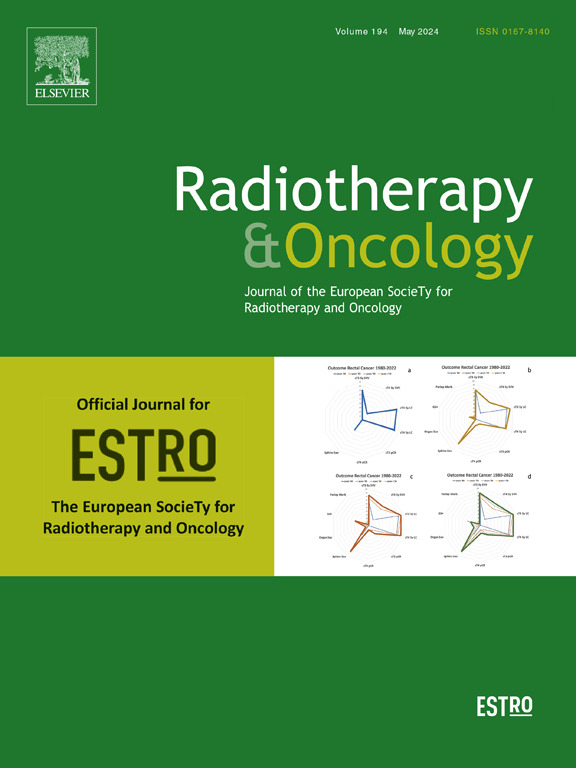li-fraumeni综合征放射诱导恶性肿瘤的预防
IF 5.3
1区 医学
Q1 ONCOLOGY
引用次数: 0
摘要
目的:Li-Fraumeni综合征(LFS)是一种与早发性癌症显著风险相关的遗传性疾病。这种情况是由TP53基因的种系突变驱动的,TP53基因在辐射反应的调节中起主要作用。异常的TP53功能导致辐射易感性和继发性、辐射诱导的恶性肿瘤的更大风险。因此,LFS患者的治疗选择通常仅限于排除放射治疗(RT),否则放射治疗可能对原发性肿瘤的治疗有益。我们实验室的数据表明,与野生型相比,突变型p53患者皮肤成纤维细胞对辐照(IR)的转录组反应异常;然而,目前尚不清楚重编程这种辐射反应是否可以降低LFS中辐射诱导的恶性肿瘤的风险。二甲双胍是一种常用的抗糖尿病药物,与较低的癌症发病率有关,并可能降低小鼠LFS模型中癌症相关的死亡率。除了其潜在的抗肿瘤性外,最近的研究还揭示了二甲双胍在正常组织中预防ir诱导损伤的能力;因此,我们假设二甲双胍可以重新编程辐射反应,以防止辐射损伤并延迟LFS中辐射诱导肿瘤的发生。材料与方法:为了建立LFS小鼠辐射诱导肿瘤模型,并研究二甲双胍是否能延缓该模型中肿瘤的发生,在存在和不存在二甲双胍的情况下,对携带TP53R172H/+热点突变的小鼠进行全身或局部IR。连续MRI监测肿瘤发展情况。为了了解二甲双胍对体内突变型p53辐射反应的影响,我们建立了类似的小鼠工作流程,并从未治疗和二甲双胍治疗的队列中纵向收集照射过的皮肤,进行全转录组测序。测序数据在一个单独的小鼠队列中使用流式细胞术进行功能验证。同时,我们对LFS患者成纤维细胞进行了RNA测序,以表征二甲双胍对人体辐射反应的影响。结果:我们证明IR加速了TP53R172H/+小鼠的肿瘤发病,二甲双胍显著延缓了辐射场内肿瘤的发展。此外,对患者和小鼠样本的转录组学分析显示,二甲双胍上调IR后的细胞凋亡。小鼠肿瘤和辐照皮肤组织的流式细胞术分析证实了这些发现,表明二甲双胍促进IR后受损的潜在致瘤细胞的凋亡驱动清除。结论:总的来说,我们发现二甲双胍延缓了LFS小鼠辐射诱导的肿瘤发病,并开始描述这种对IR重编程反应的生物学基础。这项研究首次强调了二甲双胍在种系突变型p53中作为放射保护剂的作用,有可能扩大LFS患者的放疗选择。本文章由计算机程序翻译,如有差异,请以英文原文为准。
THE PREVENTION OF RADIATION-INDUCED MALIGNANCIES IN LI-FRAUMENI SYNDROME
Purpose:
Li-Fraumeni Syndrome (LFS) is a genetic disorder associated with a significant risk of early-onset cancer. This condition is driven by germline mutations in the TP53 gene which plays a primary role in the regulation of the radiation response. Aberrant TP53 function contributes to radiation vulnerability and a greater risk of secondary, radiation-induced malignancies. As a result, therapeutic options for LFS patients are often limited to exclude radiotherapy (RT), which may otherwise be beneficial for the treatment of primary tumours. Data from our lab demonstrate an aberrant transcriptomic response to irradiation (IR) in mutant p53 patient skin fibroblasts compared to wildtype; however, it is unknown whether reprogramming this radiation response can decrease the risk of radiation-induced malignancy in LFS. Metformin, a commonly prescribed anti-diabetic drug, is associated with lower cancer incidence and may decrease cancer-related mortality in murine LFS models. In addition to its potential anti-tumourigenicity, recent studies have shed light on the ability of metformin to prevent IR-induced damage in normal tissue; hence, we hypothesize that metformin can reprogram the radiation response to protect against radiation injury and delay the onset of radiation-induced tumours in LFS.
Materials and Methods:
To establish a murine model of radiation-induced tumours in LFS, and to investigate whether metformin can delay tumour onset in this model, whole-body or localized IR were administered to mice harboring a hotspot TP53R172H/+mutation in the presence and absence of metformin. Serial MRI was conducted to monitor for tumour development. To understand the effect of metformin on the mutant p53 radiation response in vivo, a similar murine workflow was established and irradiated skin was collected longitudinally from untreated and metformin-treated cohorts for whole transcriptome sequencing. Sequencing data were functionally validated in a separate cohort of mice using flow cytometry. In parallel, we performed RNA sequencing on LFS patient fibroblasts to characterize the effect of metformin on the human radiation response.
Results:
We demonstrate that IR accelerates tumour onset in TP53R172H/+ mice, and that metformin significantly delays the development of tumours within the radiation field. Moreover, transcriptomic analyses of both patient and murine samples revealed that metformin upregulates apoptosis following IR. Flow cytometry analysis of murine tumours and irradiated skin tissue validated these findings, demonstrating that metformin promotes the apoptosis-driven clearance of damaged, potentially tumourigenic cells following IR.
Conclusions:
Overall, we show that metformin delays radiation-induced tumour onset in LFS mice, and have begun to characterize the biology underpinning this reprogrammed response to IR. This study is the first to highlight metformin as a radioprotective agent in the context of germline mutant p53, with the potential to broaden RT treatment options for LFS patients.
求助全文
通过发布文献求助,成功后即可免费获取论文全文。
去求助
来源期刊

Radiotherapy and Oncology
医学-核医学
CiteScore
10.30
自引率
10.50%
发文量
2445
审稿时长
45 days
期刊介绍:
Radiotherapy and Oncology publishes papers describing original research as well as review articles. It covers areas of interest relating to radiation oncology. This includes: clinical radiotherapy, combined modality treatment, translational studies, epidemiological outcomes, imaging, dosimetry, and radiation therapy planning, experimental work in radiobiology, chemobiology, hyperthermia and tumour biology, as well as data science in radiation oncology and physics aspects relevant to oncology.Papers on more general aspects of interest to the radiation oncologist including chemotherapy, surgery and immunology are also published.
 求助内容:
求助内容: 应助结果提醒方式:
应助结果提醒方式:


